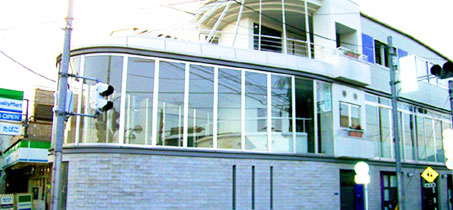若き学生時代に急遽海外放浪の旅に踏み出し、その経験から外国人賃貸業界に深い興味を抱くようになったのが、イチイ社長・荻野氏です。このコラムでは、そんな荻野の体験をコラム形式でお届けします。
※本コラムは『異文化共生住宅』をテーマにイチイ社長 荻野が2005年1月から2006年3月まで週刊住宅に寄稿したものです。
商品化をどう図るか
“ゲストハウス”の定義がまだ定まっていない。ゲストハウスの特徴の一つである入居・退室時の簡便な方法や設備の共同利用は、市場の変化と共に一般賃貸借でも導入され始め、コレクティブハウス、コーハウジング、シェアーハウスといった共同生活型住宅も現れ、ゲストハウス特有のものではなくなりつつある。
“ゲストハウスは他の賃貸住宅と何がどう違うのか”、それを明確にし他との差別化を図り商品化していく必要が出てきた。社会学、経済学、そして建築学的見地で“ゲストハウス”を見て、他の住宅との違いを探ってみた。
社会学的見地で“ゲストハウス”を見ると、新たな出会い、語学交換、文化交流などを求める人達の“共同生活の場”となるだろう。ただし、そこにはコレクティブハウス、コーハウジングのような明確な運営コンセプトや共同生活上の作業・役割分担などはない。今後のゲストハウスの課題としては、コンセプトを明確にしその目的のために集う住人の期待に応えられるようにしていく必要がある。
次に経済学的見地では、ゲストハウスの共同施設を有効に使う手法は経済効率を図った非常に経済的で合理的な方法と言える。また、住人においても共に住むことのメリットを語学交換、文化交流といった形で生み出している。まだまだスケールメリットを出す方法、効率化は見つかりそうである。
そして建築学的視点からは、学生寮、社宅そして古アパートを用途変更またはリフォームしている例が多いゲストハウスは、法規制のみならず運営面での問題点を慎重に検討する必要がある。場合によっては建物に一定の基準を自主的に設ける必要があるかもしれない。さらに、“理想とするゲストハウス”が中古物件のコンバージョンで不可能であれば、新築を検討するのも一案である。
日本の慣習的な賃貸借に風穴を開けた形のゲストハウスはこれからどのように変貌し、成長していくのか。「相互扶助機能を持たせた住まい」「安全を共有する住まい」「経済的メリットを追求する住まい」「楽しい住まい」、これをゲストハウスが実現してくれるかもしれない。

Coexistence Housing in a Borderless Age: Beyond GuesthousesIssue 10: Challenges Facing Guesthouses – Part 2
How to Commercialize
The definition of a “guesthouse” has yet to be solidified. One of the characteristics of guesthouses, such as the simplicity of moving in and out and the shared use of facilities, has begun to be adopted in general rental housing due to market changes. This has led to the emergence of collective houses, co-housing, and share houses, making these features no longer unique to guesthouses.
It has become necessary to clarify how “guesthouses” differ from other rental housing options and to differentiate and commercialize them accordingly. From sociological, economical, and architectural perspectives, we explored how guesthouses differ from other types of housing.
From a sociological perspective, guesthouses serve as a “place of communal living” for people seeking new encounters, language exchange, and cultural interactions. However, unlike collective houses or co-housing, there are no clear operational concepts or division of labor and roles in communal living. Moving forward, it will be necessary for guesthouses to clarify their concept and meet the expectations of residents who gather there for that purpose.
Economically, using the shared facilities of guesthouses can be seen as a very economical and rational method that measures economic efficiency. Residents also create benefits from living together, such as language exchange and cultural exchange. There still seems to be room for finding ways to benefit from scale advantages and efficiency improvements.
From an architectural standpoint, many guesthouses are former student dormitories, company housing, or old apartments that have been repurposed or renovated. Not only do they need to carefully consider regulatory and operational issues, but they may also need to voluntarily establish certain standards for buildings. If the “ideal guesthouse” cannot be achieved through the conversion of used properties, considering new construction might be an option.
Guesthouses, which have created a new trend in the traditional Japanese rental market, will continue to evolve and grow. They may achieve the goal of providing housing that supports mutual assistance, shared safety, economic benefits, and enjoyment.
无国界时代的异文化共生住房:超越客栈 第10期:客栈面临的挑战 – 第2部分
如何商品化
“客栈”的定义尚未明确。客栈的特点之一,如入住和退房的简便性以及设施的共享使用,随着市场变化开始被普通租赁住房采纳。这导致了集体住宅、共居住房和分租房的出现,使这些特性不再仅限于客栈。
有必要明确“客栈”与其他租赁住房选项的不同之处,并据此进行差异化和商品化。从社会学、经济学和建筑学的角度探讨了客栈与其他类型住房的不同。
从社会学角度看,客栈为寻求新的相遇、语言交换和文化互动的人们提供了一个“共同生活的场所”。然而,与集体住宅或共居住不同,共同生活中没有明确的运营理念或劳动与角色的分配。展望未来,客栈需要明确其理念,并满足聚集在那里的居民的期望。
从经济学角度看,利用客栈的共享设施可以被视为一种衡量经济效率的非常经济和合理的方法。居民们也通过共同生活创造了语言交换和文化交流等好处。似乎还有发掘规模优势和效率改进方法的空间。
从建筑学的角度看,许多客栈是前学生宿舍、公司住房或旧公寓,已经被改造或翻新。它们不仅需要仔细考虑监管和运营问题,还可能需要为建筑主动设定某些标准。如果“理想的客栈”无法通过改造二手房产实现,考虑新建也是一个选项。
打破了日本传统租赁市场惯例的客栈,将如何继续变革和成长。“提供互助功能的住宿”、“共享安全的住宿”、“追求经济效益的住宿”、“愉快的住宿”,客栈可能会实现这些目标。
荻野社長ブログはコチラ▶ https://co-lifestyle.net

